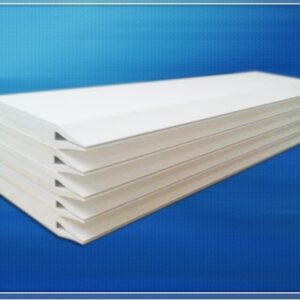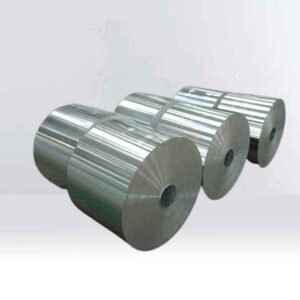Bobinas de alumínio: The Backbone of Modern Industry
Aluminum coils, versatile metal sheets rolled into cylindrical form, are indispensable across various industries due to their unique blend of lightweight durability, corrosion resistance, and thermal conductivity. This blog post explores the intricacies of aluminum coils, from their production processes and classifications to their extensive applications in sectors like construction, transportation, and packaging. Discover why aluminum stands out among metals and how its natural corrosion resistance, formed by a protective oxide layer, makes it a preferred choice for aluminum coil manufacturers mundialmente.
Aluminum coils are metal sheets made primarily from aluminum, known for their lightweight, corrosion resistance, good thermal conductivity, and excellent formability. Below are the key details about aluminum coils:
What are Aluminum Coils?
Aluminum coils are produced through hot rolling, cold rolling, and drawing, resulting in sheets with specific widths and thicknesses. They are typically made from pure aluminum or aluminum alloys and are rolled into cylindrical shapes after manufacturing.
Production Process
The production of aluminum coils involves several key stages:
1. Smelting and Refining:
Aluminum ingots are melted to form aluminum liquid. Other alloying elements enhance the material’s properties before casting it into billets.
2. Laminação a quente:
The aluminum billets are heated to a specific temperature and then passed through hot rolling mills to form thinner aluminum strips.
3. Laminação a frio:
The hot-rolled aluminum strips are cold-rolled at room temperature to improve their strength and precision further.
4. Coiling:
After cold rolling, the aluminum strips are wound into coils.
5. Tratamento de superfície:
Processes such as degreasing, anodizing, and oxidation enhance the corrosion resistance and adhesion properties of the aluminum coils.
6. Spray Coating:
A layer of paint is applied to the aluminum coil surface to improve its aesthetics and protective qualities.
7. Flattening and Packaging:
Aluminum coils are flattened to improve their shape and then packed for shipment.
Classification of Aluminum Coils
Aluminum coils can be classified based on the chemical composition they contain. Some familiar series include:
- 1000 Series: Pure aluminum with more than 99% aluminum content, offering low cost.
- 2000 Series: Aluminum-copper alloys with high strength.
- 3000 Series: Aluminum-manganese alloys with good corrosion resistance.
- 4000 Series: Aluminum-silicon alloys with excellent heat resistance.
- 5000 Series: Aluminum-magnesium alloys with high strength and corrosion resistance.
- 6000 Series: Aluminum-magnesium-silicon alloys with good workability and strength.
- 7000 Series: Aluminum-zinc alloys with high strength.
- 8000 Series: Other aluminum alloys.
Additionally, aluminum coils can be categorized based on their surface treatment and application, such as general aluminum coils, embossed aluminum coils, color-coated aluminum coils, aluminum alloy coils, and chemically treated aluminum coils.
Key Properties of Aluminum Coils
Aluminum coils boast the following superior properties:
- Leve: Aluminum’s density is only 34.61% of iron and 30.33% of copper, which helps reduce the overall weight of structures.
- Resistência à corrosão: The aluminum surface naturally forms a dense oxide film, giving it excellent corrosion resistance.
- Thermal Conductivity: Aluminum is an excellent conductor of heat, making it ideal for applications requiring heat dissipation.
- Formability: Aluminum has good malleability, enabling it to be shaped into various forms.
- Electrical Conductivity: Aluminum’s electrical conductivity is second only to copper, making it suitable for electrical cables.
Aluminum coils are indispensable in modern industry and daily life due to their versatility, outstanding properties, and wide applications.
What Are the Applications of Aluminum Coils?
Aluminum coils, with their lightweight, corrosion resistance, good electrical conductivity, and strong formability, find use in numerous fields. Below are some practical applications in various industries:
Indústria de construção
- Building Facades: Aluminum coils create aluminum composite panels and other materials for building exteriors. They offer strong aging Resistance and aesthetic appeal.
- Roofing Materials: Aluminum coils produce aluminum-magnesium-manganese alloy roofing sheets, which are lightweight, strong, and moisture-resistant.
- Partition Materials: Aluminum coils are used for partitions and ceilings inside buildings due to their excellent sound and thermal insulation properties.
- Windows and Doors: Aluminum coils are processed into various aluminum window and door profiles, offering good sealing, durability, and a long lifespan.
Transportation Industry
- Indústria automobilística: Aluminum coils are used in producing vehicle bodies, doors, and hoods, helping reduce the overall weight of the car, improve fuel efficiency, and reduce emissions.
- Railway Manufacturing: Aluminum coils are applied to construct railway cars and high-speed train bodies to reduce weight and enhance efficiency.
- Construção naval: Aluminum coils are used to manufacture ship hulls and decks, offering excellent corrosion resistance to seawater and reducing vessels’ weight.
- Engenharia Aeroespacial: Aluminum coils are ideal for producing airplane fuselages, wings, and other structural components due to their high strength and low weight, which enhance flight performance.
Indústria de embalagens
- Embalagem de alimentos: Aluminum coils offer excellent sealing and refrigeration properties and are used in the production of food cans, beverage cans, and candy wrappers.
- Embalagens farmacêuticas: Aluminum coils are used to produce medicine packaging, such as blister packs and bottles, ensuring protection from moisture and oxidation.
- Cosmetic Packaging: Aluminum coil products are used in packaging cosmetics, offering strong light-blocking and protective properties.
Electronics & Appliances
- Electrical Appliances Enclosures: Aluminum coils produce enclosures for refrigerators, washing machines, and air conditioners, offering good electrical conductivity and heat dissipation.
- Dissipadores de calor: Aluminum coils são usados to manufacture heat sinks and radiators in electronic devices, ensuring efficient heat transfer.
- Carcaças de dispositivos eletrônicos: Aluminum creates lightweight, durable, and aesthetically pleasing casings for mobile phones, tablets, and other devices.
Machinery Manufacturing
- Machinery Parts: Aluminum coils are used to produce components for machine tools, molds, and other machinery. They offer good machinability and wear resistance.
- Tool Manufacturing: Aluminum coils produce tools such as wrenches and pliers, which are lightweight and easy to handle.
Why Choose Aluminum Over Other Metals?
Aluminum has become an ideal metal material widely used in various industries for several reasons:
Propriedades físicas
- Low Density: Aluminum’s density is approximately 2.7 g/cm³, about one-third that of iron or copper, which significantly reduces the weight of structures. This feature is particularly valuable in industries such as automotive and aerospace, where weight reduction improves fuel efficiency and carrying capacity.
- Strength: Aluminum and its alloys are highly tensile. Processes such as cold drawing or heat treatment can further enhance their strength to meet the requirements of different engineering applications.
- Thermal and Electrical Conductivity: Aluminum’s thermal and electrical conductivity is second only to silver, copper, and gold. In the electronics and electrical industries, aluminum coils are used in components like heat sinks and circuit boards, ensuring the efficient operation of electronic products.
Chemical Properties
- Resistência à corrosão: When exposed to air, aluminum naturally forms a dense oxide film on its surface. This oxide layer protects aluminum from further oxidation, allowing it to maintain excellent performance even in harsh environments. Furthermore, surface treatments like anodizing can enhance its corrosion resistance.
- Environmental Friendliness: Aluminum has minimal environmental impact during production and use. It remains stable and does not release harmful substances.
Economic and Processing Benefits
- Abundant Raw Material: Aluminum is one of the most abundant elements in the Earth’s crust, making it a cost-effective material for production.
- Reciclabilidade: Aluminum is highly recyclable, and recycled aluminum costs less than new aluminum. Esse helps save resources and reduce production costs.
- Good Workability: Aluminum coils possess excellent formability, making them easy to process through cold rolling, drawing, and stamping to create various shapes and specifications.
Additional Advantages
- Apelo Estético: Aluminum coils have a smooth surface and uniform color, making them ideal for decorative applications in industries like construction and electronics.
- Wide Adaptability: Aluminum coils can be combined with other materials, such as aluminum composite panels, to extend their range of applications.
Aluminum has emerged as one of the most indispensable materials across many industries. Thanks to its unique chemical and physical properties, it breaks through limitations that other metals face.
How Does Aluminum’s Corrosion Resistance Form?
Aluminum’s corrosion resistance primarily stems from the dense oxide layer on its surface, preventing further interaction with the external environment. Below is a detailed explanation of how this corrosion resistance develops:
Intrinsic Properties
Natural Oxide Film Formation:
Aluminum is a reactive metal that quickly reacts with oxygen in the air to form a dense aluminum oxide (Al₂O₃) film on its surface. Although this oxide layer is very thin (typically around 50 angstroms under dry air), it effectively prevents further oxidation of aluminum at room temperature. Once exposed to air, aluminum rapidly forms this protective film, providing excellent defense against corrosion.
Characteristics of the Oxide Film:
This oxide film is highly chemically resistant and remains stable under normal environmental conditions, such as dry air or water, with pH levels between 4 and 8.5. It prevents aluminum from contacting oxygen, water, and other substances, thus maintaining the material’s Resistance to corrosion.
Chemical Properties
Amphoteric Metal Properties:
Aluminum is amphoteric, meaning it can react with both acids and alkalis. The oxide layer is compromised in highly acidic or alkaline environments, and aluminum may corrode. For example, aluminum dissolves quickly in aqua regia but can also be corroded by strong alkaline solutions. Therefore, avoiding exposing aluminum to highly acidic or alkaline environments for prolonged periods is essential.
pH-Dependent Resistance:
The corrosion resistance of aluminum varies depending on the pH level of the surrounding environment. The oxide film is stable in neutral pH conditions but can degrade under acidic or highly alkaline conditions. In most natural environments, aluminum performs well, maintaining long-term corrosion resistance.
Protective Treatments
- Anodização: Anodizing is a surface treatment that enhances aluminum’s natural oxide layer. The anodic process thickens the oxide layer, making it more durable and resistant to environmental factors such as moisture, acids, and saltwater.
- Revestimento: Surface coatings such as paint, powder coating, or other protective coatings further enhance aluminum’s Resistance to corrosion, ensuring longevity in harsh conditions.
Aluminum Coils: Powering Sustainable Industrial Solutions
Aluminum coils exemplify the perfect fusion of nature and technology. Their natural corrosion resistance, achieved through a self-forming oxide layer, and lightweight and malleable properties position them as a key material for sustainable industrial development. As industries strive for greener practices, aluminum coils continue to evolve, offering enhanced performance with minimal environmental impact.
At Yutwin New Materials, we are committed to delivering top-quality aluminum coils that meet the diverse needs of modern industries. Our extensive product range includes aluminum coils suitable for construction, transportation, packaging, electronics, and machinery manufacturing. All are crafted with precision to ensure durability, lightweight properties, and excellent corrosion resistance.
We take pride in our state-of-the-art production facilities and rigorous quality control processes, guaranteeing that every coil we produce meets international standards. Our team of experts is dedicated to innovation, constantly exploring new applications and improving existing ones to stay ahead in the ever-evolving market.
Look no further if you’re looking for a reliable partner to supply aluminum coils that can enhance your projects and contribute to sustainable development. Yutwin New Materials offers products and comprehensive solutions tailored to your specific requirements.
Whether you need customized specifications, specialized surface treatments, or just-in-time delivery, we have the flexibility and expertise to accommodate. Our customer service team is ready to assist you with inquiries, provide technical support, and help you navigate our extensive product catalog.
Don’t miss the opportunity to leverage aluminum coils’ benefits for your business. Contact Yutwin New Materials today to discuss your requirements and discover how our high-performance aluminum solutions can elevate your projects to new heights. We can build a sustainable and innovative future, one coil at a time.



















